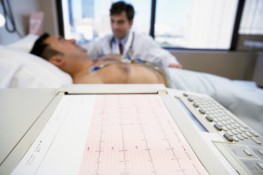Study: Missing Any of 9 Key Types of Care Significantly Increases Post-Discharge Heart Attack Death Risk
9September2014
9September2014

Heart attack patients who fail to receive any of nine crucial types of care following discharge from the hospital are 46 percent more likely to die within a month and 74 percent more likely to die within a year, according to new research published in European Heart Journal: Acute Cardiovascular Care.
“The key message is that someone’s recovery from a heart attack is not solely dependent on any single element of the care pathway,” Professor Peter Weissberg, Medical Director at the British Heart Foundation, said in a statement published by the University of Leeds entitled “One care lapse can be fatal for heart attack patients.”
“This research shows the importance of ensuring all elements of care for heart attack patients are optimally delivered,” Weissberg said. He also said that the study demonstrates the power of “real world” clinical data collected from doctors and patients.
The research data were based on a large European registry of quality of care and outcomes for heart attacks. The nine pathways of care identified by researchers included:
Researchers looked at approximately 31,000 heart attack patients from England and Wales who were discharged from the hospital over a three-year period. About half of them missed potentially life-saving care opportunities.
Lead researcher Dr. Chris Gale said that the deaths resulting from missed care were a tragedy because they could have been avoided.
“Many of these guideline recommended steps are straightforward, but for some reason they are not being provided. If more components of care are missed, the chance of dying increases further,” Dr. Gale said.
In addition to showing that missed care increases a heart attack patient’s risk of dying, the research showed that hospitals with fewer specialist cardiology beds were more likely to miss care opportunities. When care was missed within the first few hours of the onset of symptoms, it was much more likely that other types of care would be missed.
Professor Weissberg said medical centers that focus on these findings “should be able to improve further the outcome for their patients suffering from a heart attack.”
Hospital mistakes cause an estimated 440,000 patient deaths each year in the United States, according to an article in the Journal of Patient Safety, and treatment errors are one of the leading types of preventable medical errors.
The attorneys of Morrow Kidman Tinker Macey-Cushman, PLLC represent patients who have been harmed by preventable medical errors in Seattle and across Washington.